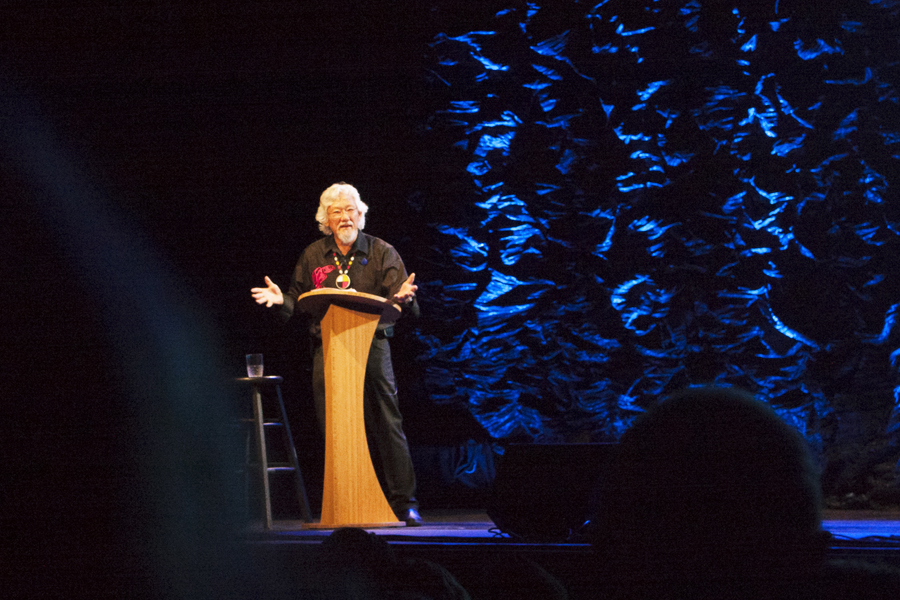David Suzuki is a geneticist, environmentalist, and broadcaster from British Columbia. He is also, arguably, Canada’s ambassador for the environment.
Suzuki made two Winnipeg appearances on the Blue Dot Tour on Oct. 24. He discussed indigenous issues at the University of Manitoba in the afternoon, and in the evening went to the Burton Cummings Theatre for his main show.
For some people Suzuki is a beacon of hope, his voice a calm call for action. In his final national tour Suzuki has set the goal of protecting Canada’s future through our environment.
Gaining its name from an image of the Earth taken by the space probe Voyager 1, and as a nod to Carl Sagan, the Blue Dot Tour captures the sobering fact that our only home is this chunk of rock and water called Earth.
The Blue Dot Tour centres on the notion that Canadians have a right to live in a healthy environment. Clean water, safe food, and clear air should be available to every single resident of our country.
The main concern of The Blue Dot Tour is that Canada falls short when it comes to environmental action. The driving force of the tour is that change is possible through Canadians’ collective actions.
There are three main goals of this movement: the formation of stronger environmental laws, the better enforcement of existing laws, and a decisive adherence to these laws in the future.
The ultimate goal of the tour is seeing an amendment to the Canadian Charter of Rights and Freedoms addressing these concerns.
The Burton Cummings Theatre event featured special guests such as Sierra Noble, who gave a roots music take on this grassroots movement with her signature fiddle and beaming smile.
Winnipeg children’smusician Fred Penner started off his performance by sharing a core philosophy in his life.
“Never underestimate your ability to influence the life of a child,” Penner told the audience.
Penner then had the audience singing along to lyrics, such as, “Home is where the heart is, home is where we learn to love,” and echoing the word “garbage” in a rendition of a song popularized by the late Pete Seeger.
Musical duo Cris Derksen and Tanya Tagaq improvised during their performance. Derksen’s cello and Tagaq’s throat singing formed a haunting piece from highs and lows.
Ovide Mercredi, a First Nations leader and University of Manitoba alumnus, spoke of the importance of accessible water and a healthy environment by telling a story of his hometown of Grand Rapids, Manitoba.
The penultimate presentation of the night was a performance by the Royal Winnipeg Ballet, a beautiful piece which captured the environmental concerns of the tour and the tone of the night through dance.
Finally, Suzuki took to the stage. “Science shapes our stories,” he said, explaining both the wonderful and concerning things that he believes shape our existence as humans.
“The environment is embedded inside, within us,” said Suzuki as he implored the audience to view the environment not as an external entity, but one that is a part of ourselves.
“Is soil a complex community of organisms, or simply dirt? Is another species our biological kin, or a resource?” Suzuki asked the audience. “The way we see the world determines the way we treat it.”
The emphasis throughout was on enacting reform.
“If not us, then who?” asked Suzuki, shortly before concluding the night.
The Blue Dot Tour encourages Canadians to make a change to the way our nation regards the environment.


